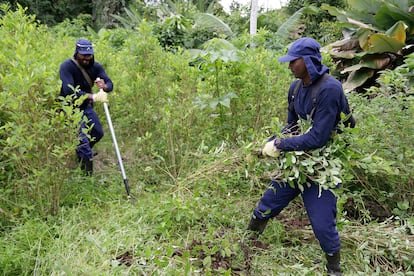Deeply flawed drug policies need urgent reassessment
Despite positive steps by the U.N., we are a long way from a comprehensive, global policy review

There is growing recognition that the war on drugs has proven to be a complete failure in achieving a drug-free world and reducing the size and power of illegal drug markets. Instead, punitive policies have led to human rights violations, harmed the health of millions, and undermined global security, economy, and social fabric. This punitive approach restricts access to essential pain relief medications and prevents drug users from accessing basic healthcare services. Here we are in the 21st century, and an alarming 80% of the world’s population does not have access to essential pain medications.
In 2019, the U.N. Commission on Narcotic Drugs convened in Vienna and issued a ministerial declaration for the next 10 years to strengthen actions at all levels and accelerate the implementation of joint commitments to address the world drug problem. A “midterm” review of the declaration is set for 2024 to evaluate the progress made and ensure ongoing alignment with the objectives.
Nearly five years later, the results are brutally discouraging, which is why this review is so important. To move forward, we need a transparent and evidence-based analysis of reality. We should also assess the recent progress made by U.N. organisms like the General Assembly, the Commission on Narcotic Drugs and the Human Rights Council. The midterm review in 2024 is an opportunity to define a drug policy aligned with the 2030 sustainable development goals and consistent with human rights, the right to health, and the right to economic, social, cultural and political development.
Throughout my career as a lawyer, judge of the Inter-American Court of Human Rights, Peruvian government minister, and human rights expert, I have personally witnessed how punitive drug control efforts in Latin America and around the world have driven violence and mass incarceration. This impact is especially harsh on women, racial and ethnic minorities, and people living in poverty. Moreover, drug prohibition has eroded the traditional, cultural, and ancestral rights of Indigenous peoples, especially in coca-growing regions.
Ahead of the 2024 midterm review, the International Drug Policy Consortium (IDPC) released its own report on December 5 with an evaluation of the outcomes of the 2019 ministerial declaration. The forceful report presents solid evidence that drug policies have failed to effectively prohibit and eradicate illegal drug markets, and their connection to citizen insecurity, violence and organized crime. As a member of the Global Commission on Drug Policy, I am proud to contribute to the IDPC’s work on drug policy.
In October 2022, the U.N. Committee on Economic, Social and Cultural Rights produced a general statement on the “impact of drug policies on economic, social and cultural rights.” The committee analyzed how prevailing drug policies permeate multiple aspects of life and pose challenges that have to be addressed. In December 2022 a so-called “omnibus resolution” was adopted in the General Assembly prescribing important advances in human rights, particularly in Indigenous rights and racial justice. It is the first official U.N. document that abandons the obsolete illusion of a drug-free world.
The U.N. Human Rights Council has adopted three resolutions on the subject. The most recent one in 2023 addressed the repercussions of drug policies on human rights (A/HRC/52/L.61). It was the most ambitious and progressive step on drug policy taken to date within the U.N., and calls on member states to consider alternatives of incarceration, conviction and punishment; it explicitly uses the term “harm reduction.”
While there have been positive developments in the U.N., a comprehensive global review of drug policies is still a long way off. The first step is to ensure that the midterm review in March 2024 fosters an open and honest discussion on the international approach to drugs. It should acknowledge shortcomings and highlight recent progress, both globally and within the U.N. system. It should establish a foundation for a comprehensive reform process that dismantles the global punitive paradigm and safeguards the health, well-being, and human rights of people worldwide, aligned with the United Nations’ Sustainable Development Goals.
Global Commission on Drug Policy
The Global Commission on Drug Policy was created in January 2011 by a group of personalities from the Americas and Europe, including former Heads of State and Government wishing to inspire better drug policy globally. Over almost 10 years now, membership grew to encompass Commissioners from around the world. Global leaders from the political, economic and cultural arenas, aware of the failure of the current drug control regime, felt that they must advocate for drug policies based on scientific evidence, human rights, public health, and security, leaving no one behind.
The mission is to shift from drug prohibition to state regulation, respecting human rights obligations. In its recent report on HIV, hepatitis, and drug policy reform, it demonstrates that detention does not effectively address health epidemics. Instead, it negatively impacts the right to health for individuals who use drugs.
Currently chaired by Helen Clark, former Prime Minister of New Zealand, the Commission has among its members a variety of former presidents and former heads of government. Among them are Ruth Dreifuss (Switzerland), Fernando Henrique Cardoso (Brazil); Geoff Gallop (Australia); Cesar Gaviria (Colombia); Aleksander Kwaśniewski (Poland); Ricardo Lagos (Chile); Kgalema Motlanthe (South Africa); Olusegun Obasanjo (Nigeria); George Papandreou (Greece); Michèle Pierre-Louis (Haiti); José Ramos-Horta (Timor-Leste), a Nobel Prize winner; Juan Manuel Santos, (Colombia), a Nobel Prize winner; Ernesto Zedillo (Mexico) and Javier Solana former High Representative of the European Union for a Common and Security Policy.
In addition to former heads of state or government, there are also prominent personalities such as Mario Vargas Llosa, writer and Nobel Prize winner; Louise Arbour, former U.N. High Commissioner for Human Rights; Mohamed ElBaradei, Nobel Prize winner and former Director General of the International Atomic Energy Agency; and Jane Philpott, former Minister of Health of Canada.
Sign up for our weekly newsletter to get more English-language news coverage from EL PAÍS USA Edition
Tu suscripción se está usando en otro dispositivo
¿Quieres añadir otro usuario a tu suscripción?
Si continúas leyendo en este dispositivo, no se podrá leer en el otro.
FlechaTu suscripción se está usando en otro dispositivo y solo puedes acceder a EL PAÍS desde un dispositivo a la vez.
Si quieres compartir tu cuenta, cambia tu suscripción a la modalidad Premium, así podrás añadir otro usuario. Cada uno accederá con su propia cuenta de email, lo que os permitirá personalizar vuestra experiencia en EL PAÍS.
¿Tienes una suscripción de empresa? Accede aquí para contratar más cuentas.
En el caso de no saber quién está usando tu cuenta, te recomendamos cambiar tu contraseña aquí.
Si decides continuar compartiendo tu cuenta, este mensaje se mostrará en tu dispositivo y en el de la otra persona que está usando tu cuenta de forma indefinida, afectando a tu experiencia de lectura. Puedes consultar aquí los términos y condiciones de la suscripción digital.









































